Oct. 14, 2021
Events : JoRC
This scientific event is placed under the scientific responsibility of Marie-Anne Frison-Roche and Arnaud van Waeyenberge. It is organized by the Journal of Regulation & Compliance (JoRC) and by the Centre Perelman of Brussels University.
This event is part of the 2021 colloquia cycle around the general theme of Compliance Jurisdictionalisation.
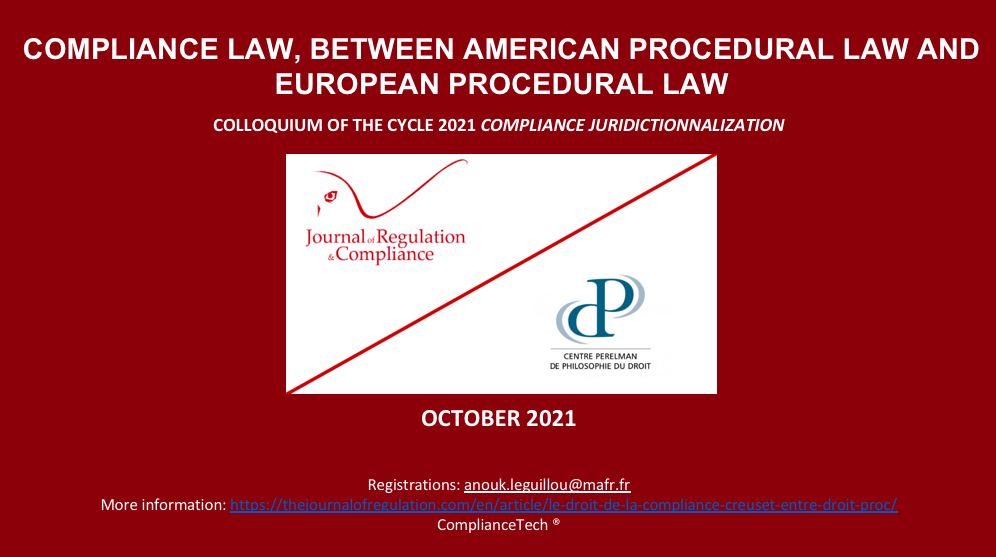
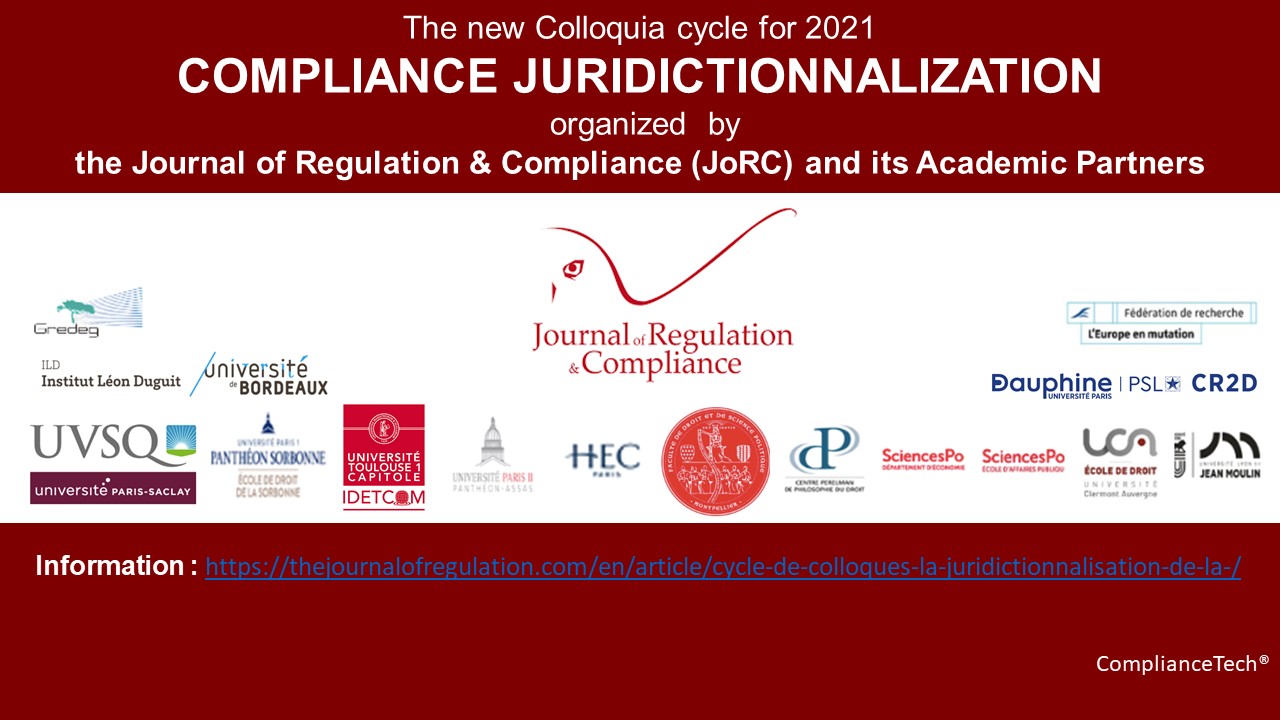
The different interventions will be then transformed into contributions in the books La juridictionnalisation de la Compliance and Compliance Juridictionnalization which will be published in the Regulation & Compliance serie, jointly published by the JoRC and Dalloz for the book in French and by JoRC and Bruylant for the book in English.
This colloquium will take place in Brussels in October 2021.
Presentation of the theme:
Notably will speak:
- Marie-Anne Frison-Roche, professor at Sciences Po - Paris
- Arnaud van Waeyenberge, professor at HEC Paris and researcher at Centre Perelman
Read a detailed presentation of the colloquium below:
Sept. 27, 2019
Thesaurus : Soft Law
Full reference: Information Note From the European Commission to the Permanent Representatives Committee About the Progress on Combatting Hate Speech Online Through the EU Code of Conduct, Council of the European Union, 27th of September 2019, 7p.
June 25, 2019
Breaking news

Le 24 juin 2019, le Régulateur irlandais a publié un rapport visant à participer à la consultation publique lancée par le ministère de la Communication, portant à la fois sur la façon dont il convient de transposer la directive européenne sur les services audiovisuels et sur la perspective d'une loi nationale sur la "régulation des contenus dommageables sur les plateformes en ligne".
Pour le Régulateur, le rapprochement des deux actes législateurs offre une opportunité d'une régulation globale des "médias en ligne", offrant à l'internaute une "sécurité" que la simple transposition de la Directive ne permet pas. Ainsi la seconde loi complétera la première.
Pour le Régulateur, la loi nationale à adopter doit permettre au Régulateur de donner une pleine sécurité à l'internaute irlandais ("online safety"), en retirant les contenants violents ou dommageables (le terme harmful est difficile à traduire par un seul mot en français) et en l'avertissant à propos de ceux-ci.
Comme l'explicite le rapport (p.52) :
The BAI considers that the following four strategic objectives and responsibilities are relevant for an online safety regulator operating within the new media regulatory structure: • Rectifying serious harms occurring to Irish residents through their use of online services. • Ensuring that individuals and members of groups that are frequently subject to harmful online content can fully benefit from digital technology and social media. • Reducing online harms by introducing online safety rules for online platforms. • Promoting responsibility and awareness of online safety issues among the general population and industry. To fulfil these objectives and responsibilities, the BAI considers that the Online Safety Regulator could have the following three functions:
1. Operating a statutory mechanism to remove harmful online content that directly affects Irish residents (Rectification of Harm)
2. Developing and enforcing an online safety code for Irish-resident online platforms (Minimisation of the potential for Harm)
3. Promoting awareness of online safety issues among the public and industry (Preventing Harm). Ensuring that online services play a more effective role in tackling online safety issues can provide wide, “collective” benefits to large numbers of individuals simultaneously.
Visant expressément Youtube et Facebook, qui en Europe ont choisi de se localiser en Irland, le Régulateur demande une Régulation des plateformes de partage de vidéos qui doit, à travers un Code s'appliquant à eux, permettre de régir leur activité qui se déploie à travers toute l'Europe. Ce Code aurait vocation à rappeler en premier le principe de la libre expression. Tout en organiser la "sécurité en ligne" de l'internaute.
Le Régulateur irlandais des Médias sera en charge de cela. Et puisque les opérateurs sont localisés en Irlande, ses conceptions et ses actions auront donc un effet européen : comme le dit le Président de l'Autorité de Régulation lui-même : " This is a particularly important issue for this country, given that many of the majoar international platforms are based her. Ireland has a unique opportunity - and responsability - to lead the debate and chart the way forward in relation to online safety and regulation".
____
"to lead" ?
Il n'est pas certain que les autres régulateurs nationaux ni la Commission européenne partagent une telle conception irlando-centriste de la régulation euroréenne des médias.
Dec. 13, 2018
Events : JoRC
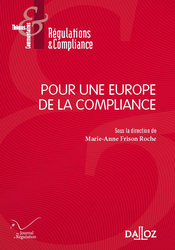
Oct. 4, 2018
Events : JoRC

Sept. 6, 2018
Events : JoRC

April 14, 2018
Breaking news
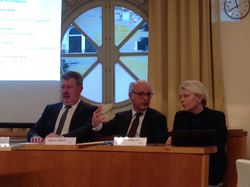
March 3, 2018
Events : JoRC
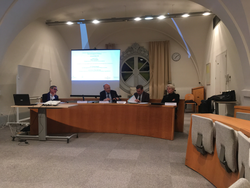
Among all the things that were important to remember, one of the things that struck me most in the extraordinary conference of the President of the Court of Justice of the European Union Koen Lenaerts on "Europe of the Compliance "held on March 2, 2018 was his ability to make" live Europe ". Not only to make it understand but also to make it "live". Here is the challenge: that compliance is not an accumulation of processes without reason and without flesh, but a living whole taking its meaning into consideration of the human being, a person whose judge is concerned.
On 2 March 2018, Koen Lenaerts therefore came to an amphitheater at the University Panthéon-Assas (Paris 2) to inaugurate the series of conferences organized by the Journal of Regulation & Compliance (JoRC), a cycle that has the general title: Pour une Europe de la Compliance (For the Europe of Compliance). The School of Public Affairs of Sciences Po, the Department of Economics of Sciences Po, the Ecole doctorale de droit privé (Doctoral School of Private Law) at the Université Panthéon-Assas- Paris 2 (Panthéon-Assas University - Paris 2) and the School of Law of the University Panthéon-Sorbonne (Paris I), are associated with this cycle. Many personalities will take the floor.
Presented by Professor Thierry Bonneau, the conference made by President Koen Lenaerts was extremely rich and solid, perfectly constructed. Everyone had known the quality of the conference to be delivered by the President of the CJEU. The content of his demonstration will be found in the article he will give for the book that will be published in the Régulations & Compliance Series edited by Marie-Anne Frison-Roche at Éditions Dalloz. And the reader will find all the strength of this demonstration. This is necessary to venture into this area of "Compliance" : Koen Lenaerts recalled that we were still looking for the definition and a French term that would do justice to a satisfactory definition!footnote-90. This question was echoed by Antoine Garapon in his discussion.
Embodying the firmness that must be shown when words are uncertain, President Koen Lenaerts emphasized that the European Union is based on "Rule of Law". This means that the behaviors must respect Law. For that, - and that is why it is necessary to take in the literal sense the English expression "to comply with", the enterprise must not be passive but to make sure that its behavior is actually respectful of legal prescriptions. In this, there is a general paradigm shift, which inverses the relation betwenn the operator and the rules, from the Ex Post to the Ex Ante!footnote-89 as the entreprise has to be itself active to secure the effectiveness of the rule of Law. This internalization of the rule by the company develops both a procedural culture and a behavioral culture, in which companies can express an ethical dimension and build a "Trust Pact" !footnote-88 with states and public authorities. This change has been brought about by globalization, since states no longer have the means to impose ethical norms of behavior on businesses through the Ex Post intervention of their jurisdiction, but States like companies are gaining the benefit of this internalisation of rules in compagnies because the Compliance is inseparable from the accountability by which the company is compelled to justify that it actually tends to achieve the overall goals assigned by the public authority.
Thus, after exposing the general movement by which Europe opened up to this upheaval, President Koen Lenaerts took on three technical dimensions crossed by this new conception. The first is the Financial Markets Law. The second is Competition Law, about which the President has notably developed the Court's reflections on whether the adoption of a compliance program by an enterprise found to have violated Competition Law, in particular by "negligence" is neutral, or constitutes a mitigating circumstance or constitutes an aggravating circumstance. This question was taken up after the presentation in the discussion with the room. The third is that of personal data. Taking again as in a waltz with three times his remarks, the president of the Court of Justice found that the compliance, whereas it consists in transforming the Ex Post into Ex Ante becomes juridicalised and in this the Court of justice holds its not only in Europe but also in relation to the world, without however ever forgetting that it is the States that are drawing up the rules that are the foundation of Europe.
We will find in the article that will be published all these precious elements and no doubt that the elegance of the pen will be equal to that of speech.
But, written exercise requires, the reader will not find what we had the chance to attend: the story of two cases by the one I would prefer to name the "Professor Koen Lenaerts".
Two famous cases, which we teachers, comment and remind in our courses, that students learn and recite, quote in their copies. But never that way.
The first case is the Schrerms case, where the court said that Facebook could not transfer this person's personal data to the United States since he was opposed to it. To make it clear, the President revived it through the litigant, who was a student and for this reason he spoke directly to the students present in the amphitheater. He pointed out that the plaintiff at the origin of the case was a law student, like them. He detailed his situation in Austria, making some quotes in perfect German, pointing out that this student was now at the doctoral stage, inviting students to be brave, as he was. At each episode of the story, the speaker told the students, making some detours on his own student life because finally we were all in family ... Alma Mater. But his hands were telling the story even more: they were thrown themselves into the story, they brewed the space, it seemed as if they themselves were no more grandiloquent than the speaker but found their place exactly , in a magisterial position. Yes, here is a president in front of which companies have a hard time hiding the truth, a president with such firm hands and whose torso does not move but turns to the left and right to talk to everyone.
The second story was even more beautiful. The Google Spain case, I know it. I even know it by heart. I read it, commented on it, cited it a lot of times ... But all of a sudden that's what happened to a small Spanish merchant: President Koen Lenaerts told us his story, and I rediscovered the case. A small Spanish shopkeeper, whose name the speaker uttered in perfect Spanish, obtained from the Court of Justice that his "right to be forgotten" was recognized. President underlined the apparent paradox of his insistence for the appearance of his surname in the judgment by which this person had thus obtained the erasing of his surname! Yes, I did not notice ... Why did he ask for the mention of his name in the right to have his name deleted? Because it's a matter of honor. This is what the speaker insisted: do not joke with honor. And if you do, even Google will lose.
The merchant had been subject to a forced property sale procedure because of financial difficulty, which spanish newspapers had echoed. His honor was been trampled. Then, by a happy return of fortune, he had recovered his property, his prosperity, his reputation. But from that, the press had not talked about it. Some lines in a newspaper of legal announcements, but that it is nothing for the human soul. That's why he wanted these mechanical digital links to disappear, which always and for all end up with articles presenting him as a wretch without ever ending up with articles presenting him as a prosperous merchant (because of the non-existence of these second articles).
The speaker emphasized this dimension very much. And we know that the General Regulations that will come into force in May 2018 on personal data, which intrigues so much the Americans, draws in the judgment Google Spain its main solution in the matter: this "right to be forgotten" , subjective right so strange.
He emphasized this dimension very much. And we know that the General Regulations that will come into force in May 2018 on personal data, which intrigues so much the Americans, draws in the judgment Google Spain its main solution in the matter: this "right to be forgotten" , subjective right so strange.
Listening to President Koen Lenaerts, how not to think of Carbonnier? to his articles of it, especially on sociological rule : "small causes, great effects"?
From this conference, it will remain a great article, but as in the theater, where the ephemeral is part of the beauty of this art, what were these two stories, told by the one who knew how to listen when it was necessary to decide the two cases, stories told with the two firm hands that danced inviting students to enter this round, even as the President of the Court of Justice had to leave immediately to Luxembourg to hold such heavy obligations, yes it was simply beautiful .
Sept. 6, 2017
Breaking news

Regulation of the digital world, we agree on its necessity, we talk about it a lot but it is difficult to do it.
The stakes are multiple: management of innovation, protection of people, treatment of different sorts of powers, future of the human being, the Politics and the Judge being like a bullet that ricochets between these 4 subjects.
It then rediscovers that the first "regulators" are the Governments and that the first modality of the Regulation Law is the taxation.
Notably in the digital field and even more so in the face of GAFA.
Indeed, the 4 American companies, Google, Apple, Facebook and Amazon, admit the need for rules but propose self-regulation or co-regulation. These would include not only their own behavior, but also those of others, including the fight against terrorism. Maybe, when one is stronger than the States, he should substitute himself for their core business....
Undoubtedly being dispossessed of the regalian, Europe today demands "accounts" to the GAFA in the literal sense of the term. Indeed, the French and German governments will table in September a tax proposal specific to the GAFA, the fruit of which will come back to the countries where they earn their income.
Concerned companies replied that in the tax system everyone has the right to be skilled and to organize at the best, so long as one does not fall into the abuse. In accordance with this legal conception, the French administrative high Court (Conseil d’État) has just recalled it in an important decision to their benefit.
In August 2017, the French Minister of Economy and Finance, Bruno Lemaire, justified the reiteration of his will to tax them, raising this issue at European level in the name of "distributive justice", the Law being defined as what gives everyone his share. This is a strong but dangerous argument, for while it is true that in the very function of taxation, correlated with public finances, the redistributive function is essential, tax optimization becomes staggering.
In a more convincing and regulatory way, this measure of equity is presented as correlated to the construction of the European digital market. It is an economic conception. To the extent that European taxation is still embryonic, its link with such a construction would make it possible to see in vivo the strength of the tax tool in Regulation Law, more than ever distant from Competition Law.
It is in this context, and because the European Digital Market must be built at forceps, since the GAFA will benefit from it, but also must participate in its construction, that such an investment sharing is justified.
March 8, 2016
Thesaurus
Complete reference : Ossege, Ch. (dir.), European Regulatory Agencies in EU Decision-Making.Between Expertise and Influence , Palgrave MacMillan, 2016, 216 p.
March 7, 2015
Bibliographic Reports : Books
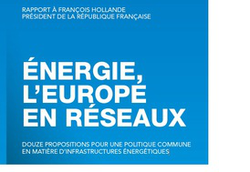
It is often argued that energy because it is a matter of sovereignty and because it is rooted in the territory, returns to the State. But it is resolutely towards Europe that Michel Derdevet pulls the whole system.
Probably by conviction, by will of a strong Europe and because there has economic power only when propped on energy. However, an energy system that is up by networks as in energy, we never doubted the convergence between the container and the content, meaning that the energy source is irrelevant whitout being carried, whitout being 'provided to users.
This construction of the networks is political and it is in terms of "mesh" that the report Michel Derdevet just submitted to the President of the Republic, François Hollande, presents a European project. In a way, it is not "revolutionary", as it is to finally fulfill the will of those who conceived Europe in 1945 through the coal, steel and energy, to a common Europe from which built the industry, not only for the reconstruction of Europe but for its economic dynamism and its common security policy.
In this, the European network of the transportation of electricity is essential. Yet it is to be done because the legislation of the European Union rather liberalized energy markets whitout building Europe of energy, leaving remaining national specificities. The result is what Michel Derdevet rightly called "inertia".
He therefore proposes the establishment of an "European industrial project." In this context, Michel Derdevet requires better definition of "model of norms and regulation", aiming in particular the structure of tariffs that include or not the R & D according to the Member States, claiming the alignment of the tasks of network operators and a price guarantee for users, which would facilitate investment. He stressed that national regulatory differences hinder the development of smart grids (and therefore the European market). Without a convergence of regulations, interoperability is not optimal, as it would allow Europe to be a major global player in energy.
Michel Derdevet therefore advocates regulation that goes to both a stronger European articulation, but at the same time which must be more "decentralized", for users to make better use of new uses of energy through the action of regulators they are close.
It is true that we are very far off ...
This is why the author asks what one favors "regulatory convergence". This is not only to harmonize rules but also to redirect them to detach the competitive prism to direct them to the long-term financing.
It is true that Europe's energy, without which a single industrial space can hardly be, can not actually do if the regulation does not resolutely takes over the principle of competition, competition remaining in the moment of exchange, while the Regulation is in the long term and what to take to designate as "industrial policy" which is nothing but a form of expression of the Political.
So what Michel Derdevet request, what ever that finally the arrival of a political Europe, the need for it finds its place in the global competition.
Dec. 18, 2014
Thesaurus : 06. European Commission
Dec. 15, 2014
Breaking news

The European Directive of 22 October 2014 ot the European Parliament and of the Council as regard disclosure of non-financial and diversity information by certain large undertaking and groupe comes from afar.
Some present it as a step of an "irrestible rises of Corporate Social Responsabilité. This text would be a a "step forward" and a "strong signal".
It is true the Directive of the European Parliament and the Council follows a consultation conducted for several years by the European Commission on the subject of Social Responsibility. Whatever might have said the "stakeholders", the Directive contains the same lines tham the European Commission Communication of 13 April 2011, adopted on 25 October 2011 on the topic.
It is difficult today to oppose "Hard Law" and "Soft Law": Law hardens gradually. Thus, from the "communication", we went to the "resolutions", whose status remains uncertain, both a communication firmer but less binding than a law, since resolution is only for its author ... Thus Parliament in its resolutions of 6 February 2013 'resolved' to design an "inclusive" vision of the corporate action, to dance together profitability and social justice. To get by, it must suffice to say that the Social Responsibility Company is "multidimensional" ... Guidelines of the European Commission (non-binding) will explicit. Wait and see.
Following a series of obligations on information that companies must make available "to the public and authorities." Thus, companies must do the work instead of public authorities themselves. The provisions relating to non-financial information are mandatory and standardized. They are particularly demanding on the environment.
But when the text provides more substantial obligations, such as making the activity business less polluting, the Directive simply ask the member states to encourage companies to adopt "best practices" in the field. The market itself is incitative, in particular for making boards of large corporations more diverses. Because the principle is the belief that "investor access to non-financial information is a step towards achieving the goal of effective .... Europe in the use of resources," in a regulatory context of a "smart, sustainable and inclusive" growth".
Feb. 5, 2014
Thesaurus : Doctrine

Updated: Sept. 25, 2012 (Initial publication: April 11, 2012)
Sectorial Analysis

Translated summaries
The translated summaries are done by the Editors and not by the Authors.
ENGLISH
The 12th General Assembly of the Association of Mediterranean Regulators
for Electricity and Gas (MEDREG) was held at the headquarters of the
Greek Regulatory Authority of Energy (RAE), on 14 December 2011. On this
occasion, members of MEDREG have approved the initial proposals made by
the Task Force devoted to investments in energy infrastructure, aiming
to stimulate investment in the Mediterranean region. The MEDRED also
exercises regulatory powers similar to those of ACER.
FRENCH
La 12ème Assemblée Générale de l’Association des Régulateurs Méditerranéens de l’Electricité et du Gaz (MEDREG) s’est tenue au siège de l’Autorité grecque de Régulation de l’Energie (RAE), le 14 décembre 2011. A cette occasion, les membres de MEDREG ont approuvé les premières propositions émises par la Task Force consacrée aux investissements dans les infrastructures énergétiques, ayant pour objectif de stimuler les investissements dans la région de la Méditerranée. La MEDRED exerce en outre des pouvoirs de régulation analogues à ceux de l’ACER.
Other translations forthcoming.
Updated: Sept. 17, 2012 (Initial publication: Sept. 13, 2012)
Breaking news
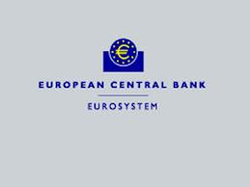
Updated: June 11, 2012 (Initial publication: May 23, 2012)
Thesaurus : Doctrine

Updated: June 9, 2012 (Initial publication: June 9, 2012)
Thesaurus : Doctrine

Updated: June 8, 2012 (Initial publication: June 1, 2012)
Breaking news
The European Central Bank says on May 31, 2012, the need for a European unified banking supervision.
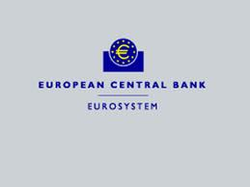
Updated: June 4, 2012 (Initial publication: May 27, 2012)
Breaking news
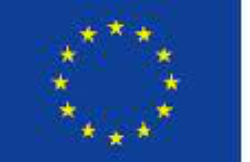
Dec. 22, 2003
Thesaurus : 05. Court of Justice of the European Union
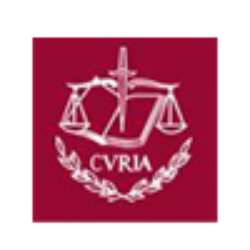
1978, 22 may, Simmenthal v./European Commission
Dec. 4, 2002
Thesaurus : 05. Court of Justice of the European Union
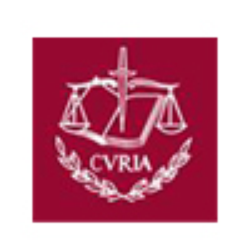
1964, 15 July, Costa v./ E.N.L.
Updated: May 22, 2012 (Initial publication: May 28, 2012)
Breaking news
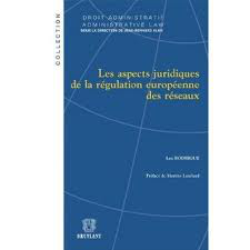
Updated: May 9, 2012 (Initial publication: April 15, 2012)
Breaking news

Updated: April 3, 2012 (Initial publication: March 26, 2012)
Contributions

